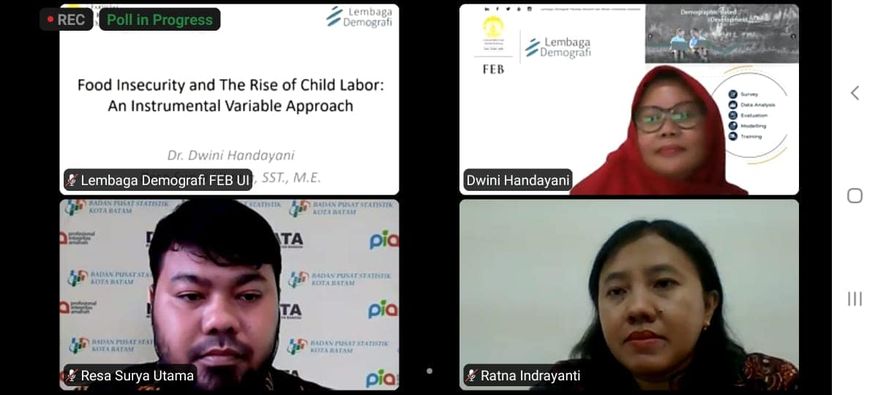Special Webinar LD FEB UI 56 Years: Food Insecurity and The Rise of Child Labor
Hana Fajria ~ PR of FEB UI
DEPOK – (28/8/2020) In commemoration of the 56th Anniversary, the Demographic Institute of the Faculty of Economics and Business, Universitas Indonesia (LD FEB UI) held a special webinar in collaboration with the Development Studies Forum (FKP), entitled “Food Insecurity and The Rise of Child Labor” on Friday (28/8/2020).
The resource person for this webinar was LD Senior Researcher, Dr. Dwini Handayani, and staff of the Batam City Central Statistics Agency (BPS), who is also an alumni of the MPKP FEB UI, Resa Surya Utama, M.E. The study was conducted on food insecurity and increasing child labor, moderated by Ratna Indrayanti, LD FEB UI researcher.
Using the 2018 Susenas (National socio-economic survey) micro data and the Instrumental Variable (IV) method with Two Least Square IV-2SLS, Dwini and Resa found a positive relationship between food insecurity and the participation of working children. In this study, food insecurity was measured by the Food Insecurity Experience Scale (FIES). In addition, they also concluded that current perceptions of food insecurity are determined by past food insecurity.
According to Dwini, “The percentage of children who work is greater in the group of children with a more severe level of food insecurity. The IV2SLS estimation results show a positive effect of food insecurity on the participation of working children, as well as the area of residence, age, gender, school participation, co-residency with a biological mother, business field and work status of the head of household. In addition, the participation of adult household members in work also has an influence on the participation of working children. “
Working children discontinue their education and development of the resources at their disposal. Labor supply theory argues that monetary poverty is one of the main reasons for their existence. However, the urge to involve children in the work environment depends on the household’s own perception of their basic needs. The Food Insecurity Experience Scale (FIES) is an alternative measurement tool to explain the emergence of child labor.
This study shows that there is a negative relationship between past exposure to hunger and current perceptions of FIES. In addition, there is a higher likelihood of child participation in work in households where FIES is severe. Apart from that, socio-economic and demographic characteristics also have a significant contribution. Ensuring the availability and affordability of food stocks is of utmost importance in combating child labour. (hjtp)
(am)




